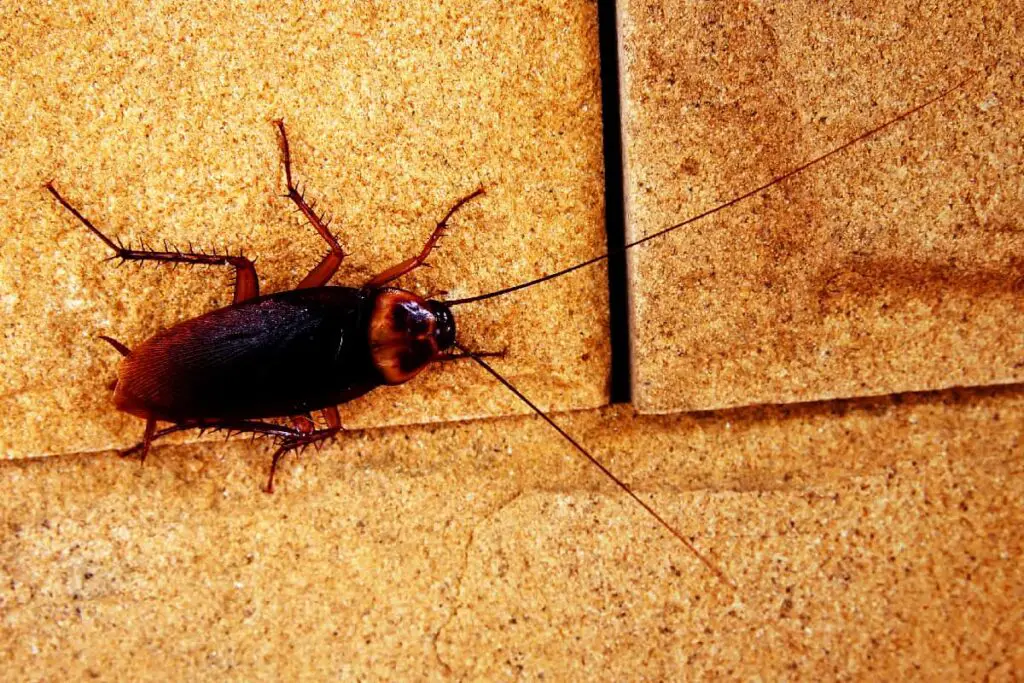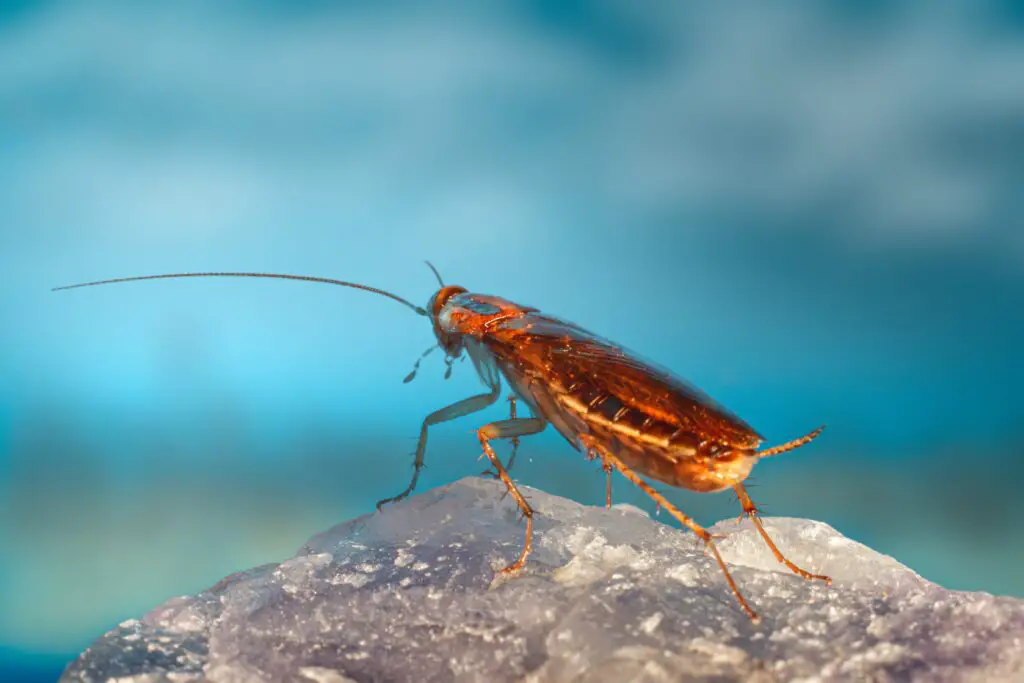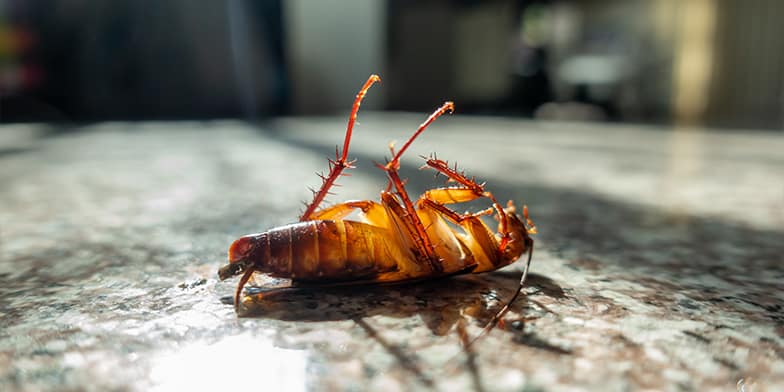
Nobody wants to see a cockroach in their home, but in most cities it’s almost inevitable. The best thing we can do to prevent these unwanted pests is to take measures reduce their interest in taking up residence. So why is it then that in your fight against cockroaches, the more you kill, the more seem to appear? Are they surviving by eating their own dead?
Cockroaches are the ultimate scavengers and will not be picky about what they are eating, even if that means resorting to cannibalism. When desperate, it is not uncommon for these insects to eat their own live babies, so to a cockroach, a dead companion is just an easy and convenient meal.
If you have a cockroach infestation, it can feel overwhelming, but don’t worry. There are a handful of useful methods for containing and exterminating these pesky survivors. Look to products available in your own home to get started, such as baking soda, bleach and vinegar. If more force is needed, there are harsher domestic-grade solutions such as diatomaceous earth, and you can always call for backup with a professional exterminator, who will use strong chemical treatments.
This article will help you understand some of the reasons that make cockroaches resort to cannibalism, and why it’s important to clear dead roaches from your home.
Why Dead Cockroaches Will Attract More
Being scavengers, cockroaches are very smart about how they obtain their food, and they definitely cannot afford to be picky. Not being stupid, they will not immediately run to the scene where another roach has been squashed.
Typically, dead cockroaches will attract more if the cause of death was through impact (ie. if you squished it). This is for two reasons. A warning acid, and a mating pheromone that are both released from the cockroaches burst glands. It’s all a little gross.
Oleic acid is an excretion cockroaches use to give warning to others nearby that there is a threat in the area. This gets released when you use your shoe to crush that roach you just noticed out of the corner of your eye, as the glands will burst from the impact. As a result, nearby cockroaches smell the acid and will know not to approach right away. They’ll wait until the scent dissipates.
Another release from the roach on impact will be it’s mating pheromone, used to attract potential mates to the area. This scent will linger in the area for a long time. Once the sense of danger has passed, males will be drawn to the enticing pheromone that lingers long after the female has been killed. Upon arrival, they will not be disappointed to find a meal instead. They really aren’t picky.
How can you stop them?
So you’ve spotted a cockroach in your home. You don’t want to let it live in your home, because that will turn into a bigger problem, but now you also know that if you squish it you’ll be faced with the possibility of it attracting more. What do you do?
The solution is simple: dispose of the dead roach and clean the area.
Take the dead cockroach and dispose of it in the garbage outside of your home. That way it takes any lingering acids and pheromones with it, and attracts the pests to a place that’s far away from you.
Secondly, you will need to disinfect the area immediately. Be generous on the potential coverage area. If you don’t want to take any chances, take it a step further and use another scent to mask any persisting mating pheromones. Peppermint is a great option, as it has been shown to be an effective cockroach repellent.
Eating Their Young
When push comes to shove, cockroaches are known to resort to eating their babies (also called ‘nymphs’). This is exclusively when food is extremely scarce in the dwelling they are inhabiting, often because an exterminator or home owner has isolated the infestation.
This isolating tactic is not always guaranteed to work. Cockroaches can live an entire month without food, and a whole week without water. Starving them out is no easy task.
So how do you prevent a cockroach problem in your own home?
Methods For Cockroach Extermination
Here are a handful of different methods to try if you’re looking to slow down and exterminate a growing cockroach infection, from DIY traps with home ingredients to chemical based treatments.
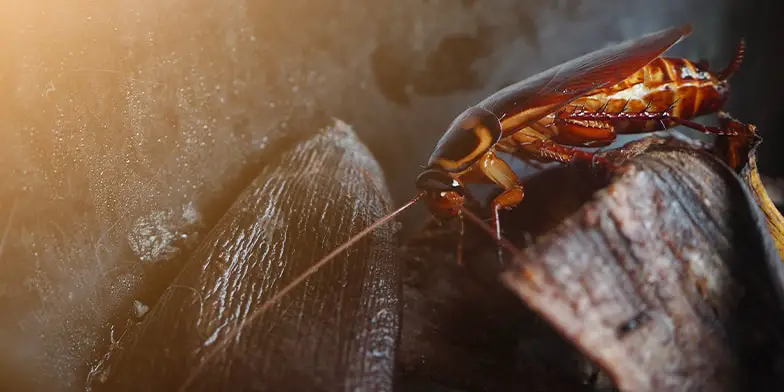
Removing Food and Water Sources
A great place to start is removing any and all attractors for cockroaches. This involves cleaning up any potential food from floors and cupboards as well as sticky spills from sweet drinks. You will also want to ensure that there is no easy access to water, such as leaks or puddles. This is the biggest one as the cockroach will die after one week without water.
Yes, this also includes cleaning up any other dead insects you may have in your home. It’s all food to the cockroach, after all!
Baking Soda
An affordable treatment that most of us have in our homes is baking soda. Dust high trafficked areas and line food traps. The consumption of baking soda is dangerous to cockroaches because of the way it reacts with their stomach acid. Creating a chemical reaction, gas will build up and the stomach bursts, killing the roach.
Sticky Traps
Sticky traps are available for purchase to the public for dealing with persistent cockroach infestations. They are little cardboard tents with a gel base that acts like a glue, trapping the insects. From here you can dispose of the cockroaches in a garbage bin outside your home.
Washing Out Drains
Cockroaches can find their way into your home through your drains. They will hide in drains because of the consistent supply of water, which (like us) is crucial to their survival. You can use bleach or vinegar, both of which are highly acidic, to wash away the pests hiding in your pipes.
Diatomaceous Earth
Diatomaceous Earth is powdered fossilized silica. This is a popular solution for insect extermination because it’s natural, and won’t harm you or your pets*. Dust high trafficked paths and nesting areas with this powder. It is strong enough to cut and damage the exoskeleton, exposing the cockroach and making it vulnerable. Shortly after, it will die.
* Unless, of course, you keep free-range insects as pets!
Hire an Expert
If the infestation is bad enough, or your DIY solutions have not produced significant results, it’s time to hire an expert. Exterminators use a chemical process to fumigate the vicinity. This will be done twice, once to ensure all eggs are killed and a second time to finish off any cockroaches that are left. For security and maintenance measures they will set up more sticky traps in case there are survivors or persistent roaches trying to settle in.
This is the most sure way to rid yourself of a cockroach infestation. Trust in the professionals!
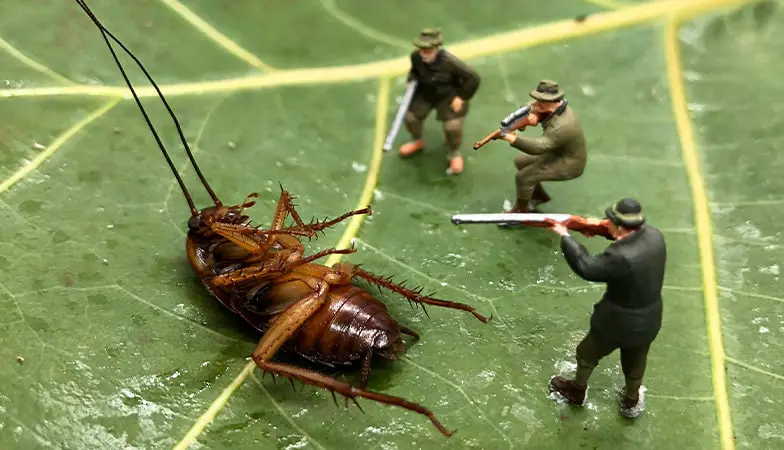
Conclusion
Cockroaches are a persistent pest. They’ve been evolving for millions of years in very hostile environments, can survive in most conditions, and they’re not picky eaters. They will eat their own, dead or alive, if need be. The battle against cockroach infestation will continue forever, and they’re persistent little bugs.
Killing a cockroach releases attracting scents to those nearby in hopes of a mate. When they stumble upon a dead insect they will see it as just another opportunity to feed, and they will not be wasteful. Iin tough situations they will resort to eating their nymphs, as they are easy prey.
You can treat an infestation yourself by cleaning your space, using baking soda, bleach or vinegar to clear your drains, or putting down traps. If the infestation is getting on top of you (hopefully not literally), call in the big guns and hire an exterminator. Some battles are not worth fighting alone.
Driven by a passion for those tiny creatures that rule our world, we at Bug Domain strive to be your go-to resource for information on insects.


